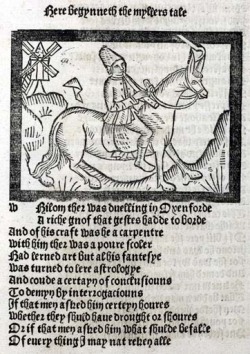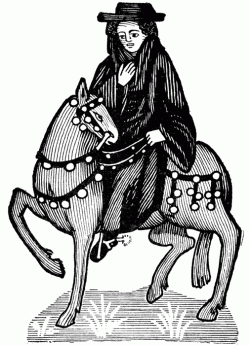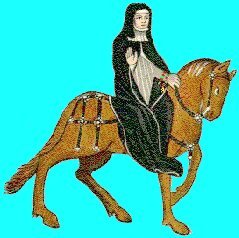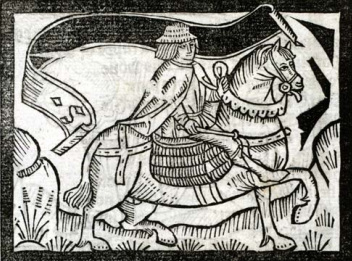The 'Fairytale'

The Miller
At school I studied The Miller's Tale, so I desperately wanted to do the naughty old Miller some justice. The chance came when I wrote a bawdy, 40-line abridged version of Rapunzel.
In the original edition of the Brothers Grimm Fairy Tales, Rapunzel innocently gives away her relationship with the prince when she asks her captor, Gothel the Witch, why her dress is getting tight around the belly. In later versions she asks in a moment of forgetfulness why Gothel is easier to draw up to her room in the tower than the prince, thus sanitizing the tale almost from its inception.
For my alternative Rapunzel story I portrayed the long-locked maiden as a young village girl who is a little too free with her virtue. Therefore Gothel, her mother in my story, locks Rapunzel away in a tower where she is wooed by a blacksmith's son in the guise of a knight. Suffice to say, the ending is not what the Brothers Grimm or their censors envisaged.
At 600 lines, or 4,500 words, The Miller's Second Tale is the shortest Canterbury Tale I've completed so far. It's also hopefully the second to find a home, and is currently being prepared for a proposed publication in the Brepols MiscS series. This anthology of neo-medieval creative writing is being edited by Dr Lesley Coote, a lecturer in Medieval and Renaissance Studies at Hull University, and editor of Wordsworth Editions The Canterbury Tales.
In this excerpt from The Miller's Second Tale, Gothel is made aware of her daughter's free and easy ways. And as the Miller warned in his first tale, it isn't for the faint-hearted:
In the original edition of the Brothers Grimm Fairy Tales, Rapunzel innocently gives away her relationship with the prince when she asks her captor, Gothel the Witch, why her dress is getting tight around the belly. In later versions she asks in a moment of forgetfulness why Gothel is easier to draw up to her room in the tower than the prince, thus sanitizing the tale almost from its inception.
For my alternative Rapunzel story I portrayed the long-locked maiden as a young village girl who is a little too free with her virtue. Therefore Gothel, her mother in my story, locks Rapunzel away in a tower where she is wooed by a blacksmith's son in the guise of a knight. Suffice to say, the ending is not what the Brothers Grimm or their censors envisaged.
At 600 lines, or 4,500 words, The Miller's Second Tale is the shortest Canterbury Tale I've completed so far. It's also hopefully the second to find a home, and is currently being prepared for a proposed publication in the Brepols MiscS series. This anthology of neo-medieval creative writing is being edited by Dr Lesley Coote, a lecturer in Medieval and Renaissance Studies at Hull University, and editor of Wordsworth Editions The Canterbury Tales.
In this excerpt from The Miller's Second Tale, Gothel is made aware of her daughter's free and easy ways. And as the Miller warned in his first tale, it isn't for the faint-hearted:
|
But soon the gossips’ tongues began to wag,
Till finally an interfering hag Named Tabitha knocked smugly on the door Of Gothel’s home, and quod, “Your girl’s a whore Who preys upon those landed, gentile folk Who’ll part with gold or silver for a poke. A lack of parent counselling’s to blame And brings upon your clan eternal shame.” Such accusations mortified and shocked Rapunzel’s mum who took a swing and clocked Her nosy neighbour squarely in the eye. Quod Gothel, “Lest my fist again should fly, Inform me where Rapunzel doth reside, Or I’ll assume through spitefulness you’ve lied. And if my girl’s unsullied as the snow, No constable shall spare you from a blow Upon your jutting, stubble-stippled chin, For wilful allegation is a sin Consigning false accusers to the fire Of Satan’s ever-burning sulph’rous pyre.” |
Reluctantly the tittle-tattling sow,
To Gothel’s violent threats was forced to bow. So to the Reeve’s abode she led the way, Where in his barnyard, rolling in the hay, They found the wayward girl beneath the Reeve. Quod Gothel, “Sir, before your lunges thieve My daughter’s blessed gift I urge you pause, Or else your earthly sojourn’s end I’ll cause.” Thus interrupted ere he’d hit his mark, Extinguished was the Reeve’s lascivious spark. So, stuck for words and in the buff he fled, Afeared at Gothel’s hands he’d wind up dead, Whilst Tabitha made good her own escape And left the fuming dame alone to gape Upon her daughter’s nakedness and shame. “Oh wretched girl,” quod she, “I’ll hear no claim Of force or through coercion being bound. For I espied how willingly you ground Your pelvis ’gainst the Reeve’s empurpled pole, Whilst eagerly he strove to find his goal.” |
A Zombie Tale

The Monk
Since The Monk's Second Tale was a commissioned piece, there were certain publishers' guidelines that needed following. Coscom Entertainment wanted the tale to be around 18,000 words in length, about the length of Chaucer's Knight's Tale. It also soon became apparent that a catchier title than The Monk's Second Tale was needed if we were going to market the story to Coscom's Zombie-Lit fan base - hence the more eye-catching title Robin Hood and Friar Tuck: Zombie Killers - A Canterbury Tale by Paul A. Freeman.
As for featuring Robin Hood in my tale, after researching the fragments of myth and legend surrounding Robin of the Hood and his cohorts, I decided the characters, along with the period in which they lived during the Great Crusade, would make the perfect backdrop to my 'zombie' tale.
As I showed earlier, from the link below you can access and preview a 6-page extract using Amazon's 'Look Inside' function, or the first chapter (10 pages) if you preview via the Drivethruhorror link
http://coscomentertainment.com/robinhoodzombies.html
Below in this excerpt from Robin Hood and Friar Tuck: Zombie Killers, Robin reacts with incredulity to Friar Tuck's story of a zombie plague, until.........:
As for featuring Robin Hood in my tale, after researching the fragments of myth and legend surrounding Robin of the Hood and his cohorts, I decided the characters, along with the period in which they lived during the Great Crusade, would make the perfect backdrop to my 'zombie' tale.
As I showed earlier, from the link below you can access and preview a 6-page extract using Amazon's 'Look Inside' function, or the first chapter (10 pages) if you preview via the Drivethruhorror link
http://coscomentertainment.com/robinhoodzombies.html
Below in this excerpt from Robin Hood and Friar Tuck: Zombie Killers, Robin reacts with incredulity to Friar Tuck's story of a zombie plague, until.........:
|
Extract from The Monk's Second Tale:
Incredulously, Robin viewed the monk And wondered if perchance the man was drunk. “You’ve sought and now discovered me,” he said. “Yet seemingly within your mind you’ve bred Some fantasies which urged you root me out, So tell me what this story’s all about.” Ere Friar Tuck could tell his baffling news A man came blund’ring through a stand of yews. Not clad in Lincoln green like Robin’s men, But in the Sheriff’s livery, and then, With fevered eye and chomping jaws assailed The outlaw Will, whose arms like windmills flailed In vain to stop this unprovoked attack. The soldier’s teeth bit deeply in the back Of Scarlet’s neck, and ripped away some flesh. He chewed as if the morsel were a fresh And juicy piece of venison or steak, Then on Will’s spurting blood he strove to slake |
His appetite and satisfy his thirst.
To Scarlet’s rescue, Robin was the first. And though the interloper took a knife Between the ribs it didn’t end the life Of this infernal denizen from Hell. But finally the vicious monster fell When Friar Tuck pulled back his cloak and drew A sword with which the evil beast he slew. “A stabbing’s not enough!” the Friar said, And with one blow cut off the creature’s head. As Will bled out and gasped, and breathed his last The Sherwood men stood silent and aghast, Their shocked expressions filled with disbelief That men could treat their kin as chunks of beef Like meat to fuel the body and sustain That force of Life ingested foods maintain. Then suddenly the corpse of Scarlet stirred As if his limbs and torso hadn’t heard About his premature and brutal end. |
The Prioress is Less Controversial in her Second Tale

The Prioress
There are several 'abridged' Canterbury Tales waiting to be expanded, and one has recently been finished. This is The Prioress's Second Tale, the story of a destitute Cumbrian lass who gets kidnapped by a wicked witch. The gist of the narrative is much in the vein of Hansel and Grettel, though as with The Wife of Bath's Second Tale I felt that a medieval story detailing female empowerment was long overdue.
The tale also highlights current trends in human trafficking and the commonly held belief in urban areas being 'greener pastures' - a belief which has led to uncontrolled rural-urban migration.
Since the original Prioress's Tale is a study in anti-semitism, from a period in history of almost zero religious tolerance, I chose to give the Prioress a kinder story the second time around, part of which is below. In this excerpt, Annabel, a poverty-stricken child, is kidnapped whilst herding pigs in a forest often frequented by Zelga the witch:
The tale also highlights current trends in human trafficking and the commonly held belief in urban areas being 'greener pastures' - a belief which has led to uncontrolled rural-urban migration.
Since the original Prioress's Tale is a study in anti-semitism, from a period in history of almost zero religious tolerance, I chose to give the Prioress a kinder story the second time around, part of which is below. In this excerpt, Annabel, a poverty-stricken child, is kidnapped whilst herding pigs in a forest often frequented by Zelga the witch:
|
But whilst her porkers snuffled round the roots
Of fruit-denuded oaks, the haunting hoots Of early-risen owls infused the air, Instilling fear and causing downy hair Upon the damsel’s grime-encrusted nape To prickle. Thinking this a childish jape, Quod Annabel, “Who makes these spooky sounds? Expose yourselves, you yellow-bellied hounds!” The owlish cries continued though, until With suddenness the atmosphere was still. And while her pigs explored the fallen leaves Upon the ground, a voice called down, “Who thieves The acorns from my chilly woodland floor?” “Forgive me!” pleaded Annabel, “I’m poor! And merely seek to fatten up my sows!” Then swooping down between the naked boughs, |
A witch appeared astride a broom that flew.
Her face was of a sickly, greenish hue, Whilst nestled on her bulbous, twisted nose There stood a skin-pink wart from which arose A score of bristling hairs as black as night. Beneath her crooked hat her hair was white And draped across her wrinkled, ancient shape She wore a flowing, scarifying cape. But oddest still, upon her shoulder sat A glossy-pelted, evil-grinning cat. Quod Zelga, “Come with me as there is room For two aboard my aerobatic broom.” With these grim words she grabbed the luckless girl Around the waist and thus contrived to hurl The struggling lass across her airborne pole. |
The Haberdasher's Second Tale

The Haberdasher
The Haberdasher (Hat-Maker) is one of the 'orphan pilgrims' of the Canterbury Tales, meaning that although he appears in The General Prologue, Chaucer never actually got round to allocating him a tale.
The other 'orphan pilgrims' are the Carpenter, the Weaver, the Dyer and the Tapestry-Maker. All of them are members of a fraternity (a guild) and wear an identical livery. With them they have a Cook, who ironically does get to tell a tale, even though only a fragment is told before the text breaks off.
The advantage of using an orphan pilgrim is that I am not bound by Chaucer's original text as to details of the Haberdasher's personality and history, and am therefore free to make the character I wish to portray him as fit the tale he tells.
The Haberdasher tells the tale of an English Troubadour-cum-football-hooligan who is tasked with cheering up the King of Ghent.
The other 'orphan pilgrims' are the Carpenter, the Weaver, the Dyer and the Tapestry-Maker. All of them are members of a fraternity (a guild) and wear an identical livery. With them they have a Cook, who ironically does get to tell a tale, even though only a fragment is told before the text breaks off.
The advantage of using an orphan pilgrim is that I am not bound by Chaucer's original text as to details of the Haberdasher's personality and history, and am therefore free to make the character I wish to portray him as fit the tale he tells.
The Haberdasher tells the tale of an English Troubadour-cum-football-hooligan who is tasked with cheering up the King of Ghent.
|
Excerpt from The Haberdasher's Second Tale:
King John of Ghent had lost his sense of fun; No joke, nor jest, nor smartly-worded pun Could lift the monarch’s melancholic mood. Queen Isadore procured the finest food To raise her husband’s spirits lest he lose The will to live, then plied the king with booze - With vintage wine and seasoned Spanish port. Yet all her ministrations came to nought. Thus Isadore, in anguish and despair, |
Devised a ruse to help her husband wear
Once more upon his troubled face a smile - A ploy to test her canniness and guile. Unto the kingdom’s Treasurer she went, And quod, “’Tis time we made a modest dent Upon the royal coffers that will lure From far afield a skilful act to cure Our sovereign’s grim affliction lest he drown In mournfulness and Death should snatch the crown.” |
